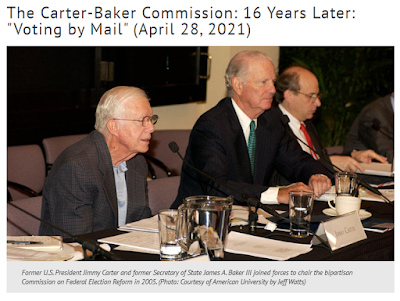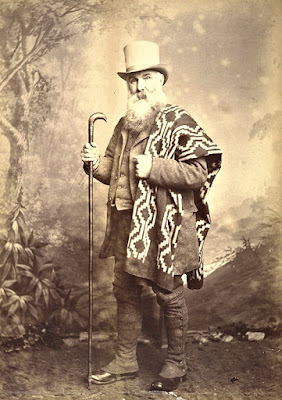Commission on Federal Election Reform, founded in 2004 by former US President Jimmy Carter and James A. Baker, III,
The commission continued work begun by Carter and former President Ford in a previous commission that studied unusual features of the 2000 presidential race. Its mandate was to examine the electoral process in the United States, bringing together leaders from the major political parties, academia, and non-partisan civic groups to explore how to maximize both ballot access and ballot integrity.
The panel suggested 87 recommendations in all in its 91-page report. Implementation of all suggestions would require congressional action for some measures, as well as a total expected cost of $1.35 billion. A major point was the commission's call for nonpartisan professional and state oversight over elections. The panel noted that both the 2000 and 2004 elections were marred by partisan, campaign-affiliated officials who held roles in the Bush campaign and Florida and Ohio Secretary of State positions. Because the Secretary of State is responsible for certifying votes, these conflicts of interest were deemed by the panel as damaging to "confidence in elections".
In the 2000, election we seen,The recount having been ended, Bush won Florida by 537 votes, a margin of 0.009%. The Florida recount and subsequent litigation resulted in major post-election controversy, and with speculative analysis suggesting that limited county-based recounts would likely have confirmed a Bush victory, whereas a statewide recount would likely have given the state to Gore. Ultimately, Bush won 271 electoral votes, one vote more than the 270-to-win majority, despite Gore receiving 543,895 more votes (a margin of 0.51% of all votes cast). Bush won 11 states that had voted Democratic in the 1996 election: Arkansas, Arizona, Florida, Kentucky, Louisiana, Missouri, Nevada, New Hampshire, Ohio, Tennessee and West Virginia.
It was the fourth of five American presidential elections, and the first in 112 years, in which the winning candidate lost the popular vote, and is considered one of the closest elections in US history.
During the 2004 United States elections, concerns were raised about various aspects of the voting process, including whether voting had been made accessible to all those entitled to vote, whether ineligible voters were registered, whether voters were registered multiple times, and whether the votes cast had been correctly counted. More controversial was the charge that these issues might have affected the reported outcome of the presidential election, in which the incumbent, Republican President George W. Bush, defeated the Democratic challenger, Senator John Kerry. Despite the existing controversies, Kerry conceded the election the following day on November 3.
There was generally less attention paid to the Senate and House elections and to various state races, but some of them were also questioned, especially the gubernatorial election in Washington, which was decided by less than 0.01% and involved several recounts and lawsuits. The final recount also reversed the outcome of this election.During the 2004 United States elections, concerns were raised about various aspects of the voting process, including whether voting had been made accessible to all those entitled to vote, whether ineligible voters were registered, whether voters were registered multiple times, and whether the votes cast had been correctly counted. More controversial was the charge that these issues might have affected the reported outcome of the presidential election, in which the incumbent, Republican President George W. Bush, defeated the Democratic challenger, Senator John Kerry. Despite the existing controversies, Kerry conceded the election the following day on November 3.
Representative Dennis Kucinich (Democrat from Ohio) commented on allegations of voter suppression in Ohio during the 2004 election:
Dirty tricks occurred across the state, including phony letters from Boards of Elections telling people that their registration through some Democratic activist groups were invalid and that Kerry voters were to report on Wednesday because of massive voter turnout. Phone calls to voters giving them erroneous polling information were also common.[18][19]
John Pappageorge, a Republican state legislator in Michigan, said in summer 2004, "If we do not suppress the Detroit vote, we're going to have a tough time in this election." Pappageorge later claimed he was taken out of context saying, "In the context that we were talking about, I said we've got to get the vote up in Oakland (County) and the vote down in Detroit. You get it down with a good message



Comments
Post a Comment